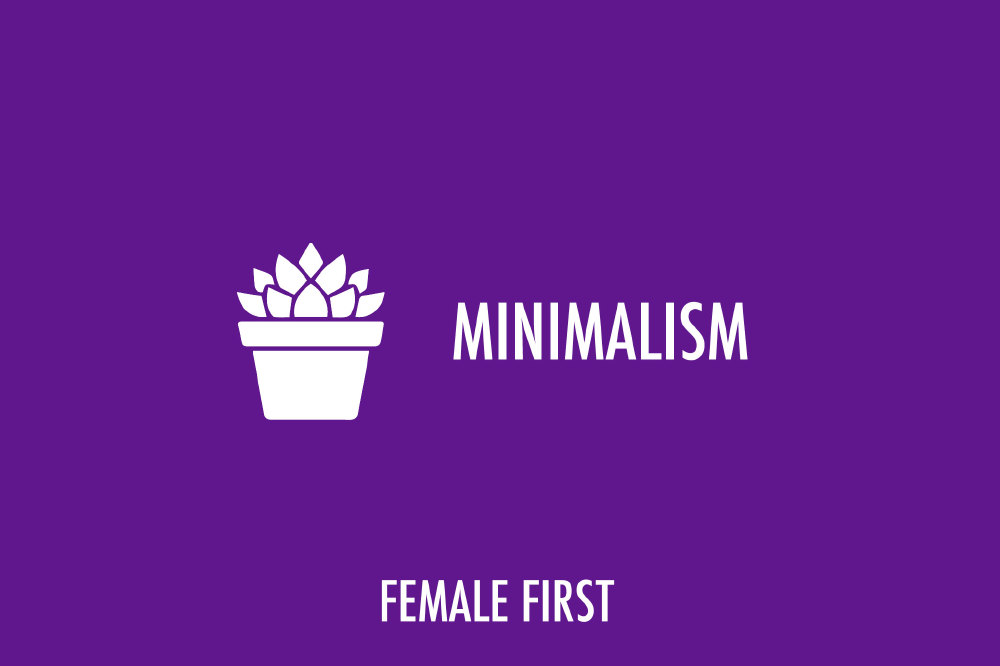Clutter is a natural part of life. As life goes on, you collect things that you need or want that sit in your home through the years. Everyone wants to hold onto what they own, but as your clutter builds, it may cause you to experience more stress.

Minimalism on Female First
This side effect of a cluttered home is what makes many people try a minimalist lifestyle. Minimalist cleans up your life and reduces your stress and anxiety, which is something everyone could benefit from.
If you're interested in switching to more of a minimalist lifestyle, read these six tips to declutter your home and your mind. As you improve both at the same time, you'll notice that you experience more joy and peace in your daily life.
Analyze your rooms
It's not enough to come the realization that your home is cluttered. You have to walk through each room and analyze the clutter that it contains. Figure out which rooms have the most mess and which features of the room stress you out the most.
Analyzing each room in your home builds the foundation for how you'll approach the physical and mental clutter you're dealing with. You'll learn the physical messes you dislike and learn what specifically about them stresses you out so you can avoid it in the future.
Throw out old things
The next step is to throw out all the old things that make up the clutter. This may be the hardest part of your switch to minimalism. It's easy to make up excuses to keep things you haven't used in years. You might worry that you'll need something one day or make someone upset when they found out you tossed out their old gift to you. That's the negative mentality fostered by continuous clutter.
It's time to take a deep breath and let go of belongings that don't do you any good. Storing the clutter in a different space doesn't rid your life of the stress it causes. Find a way to make peace with letting go and step out of your comfort zone it initial real change.
Determine needs and wants
The idea of separating your needs and wants has existed long before the concept of minimalism became popular. The Amish have taught this value for centuries to make life much easier for everyone from children to adults.
Whenever you're considering something you think you need, ask yourself why. You want to buy the newest book from your favorite author, but what you need is a good story to entertain you. The minimalist approach would be to read a book you haven't read that you already own before adding more clutter to your house.
Use this approach towards materialistic things and your mentality. Your thoughts may say you want to spend time alone, but you actually need someone to comfort you. Use this approach to maintain the minimalist lifestyle you've begun after you've cleaned out your home.
Remove emotional attachments
Mental clutter can lead to physical clutter because of emotional attachments. Think of the little things around your home. The baseball from when you were a kid or the ripped jacket you got as a birthday gift last year. You never use either of those things. They're only still in your home because of the emotional attachments you have to them.
Think about what means the most to you in your home and what has lost value over time. The ripped jacket that doesn't keep you warm is only taking up space, much like the dirty baseball that's too small to play catch with. Clear out the emotional attachments that don't serve a clear purpose to clear out your home too.
Practice thoughtful shopping
In the future, practice thoughtful shopping based on your needs. The easiest way to start this habit is to create a minimalist budget where you only spend money on your monthly bills or necessities. Take a small bit of money that's leftover for the occasional splurge, like a milkshake after dinner.
That will leave you with money you can put towards your savings, so you're thoughtfully building your fall-back fund while only buying what's necessary.
Keep what you're grateful for
Now and in the future, only keep what you're grateful for in your home. Everything should serve a purpose that makes life easier or more enjoyable. If you're grateful for everything you own, you won't have clutter to worry about. It clears your home of negative energy and restores mental peace at the same time.
Take your time adjusting to your new minimalist lifestyle. Gradually begin your new habits and mentality to get used to them and form healthy habits. After a while, you'll see how your minimalist efforts improve both your home and your daily mindset.
Kacey Bradley is the blogger behind The Drifter Collective, an eclectic lifestyle blog that expresses various forms of style through the influence of culture and the world around us. Along with writing for her blog, she has written for sites like U.S. News, SUCCESS, Guides for Brides, Hotel Online and more!
Follow Kacey on Twitter and subscribe to her blog to keep up with her travels and inspiring posts!
Tagged in Minimalism Decluttering

